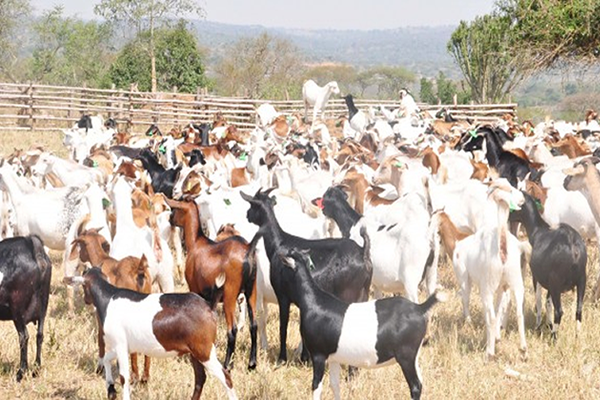

Francis Kimani studied Kiswahili, History and Journalism where he majored in public relations. His desire to get employment by teachers service commission (TSC) faded out after he went for an interview for a position that attracted very many graduates with the same qualifications like him.
“We appeared around 70 of us at the interview for the TSC job while the employer only wanted one Kiswahili and History teacher. The person who was taken graduated in 1997 at Kenyatta University compared to me who graduated in 2009. I just gave up and it is at that time that I sought an option,” Kimani begins to share his story as that experienced at the interview marked his turning point
With ‘small’ savings Kimani started looking for other avenues. He went to small businesses but failed at some point and with little saving, opted for farming. This was towards the end of 2010 and at the beginning of 2011, and the first thing was to look for land where he began his farming.
From goats which he bought at Kshs 2500 and the ‘kienyeji’ (locally breed) chicken which were at that time very lucrative when he started the farm at Munyu seven and a half kilometres from Makongeni, today produces beef, mutton and goat meat.
“We were also doing pigs and chicken but so far we have offloaded them because they were a bit costly compared to cattle who just need to graze and maybe a supplement with a little hay and other feeds like mineral salt sporadically apart from constant spray to reduce in house and external infestation by worms,” he says.
To ensure professionalism, Kimani visited different ranches like Kahawa Sukari ranch time and again, to learn about the different breeds and breeders, trying to establish if there is possibility of marrying the breeds until he met a professional veterinary officer.
“It was during my many visits to Kahawa Sukari ranch that I met Mr. Njoroge the Vet who asked me of what I really like at the ranch and I told him of the pure breed of sheep. He advised me that they don’t sell pure breed of sheep. He advised me just to buy a breed and look for a kienyeji breeder. Of course when you start with your own breeder, it comes with F1,F2 and then pure, then you offload the ones you don’t want,”Kimani.
Comparing sheep and goats rearing to cows, Kimani says it is a bit expensive to keep the cows. “The way we call them heavy grazers, they require alot of feeding as opposed to sheep and goats who are slow grazers and browsers.That is why few months of drought can wipe out the entire herd.
He says the cows are also expensive, that one cow can cost up to Kshs. 30,000 and will take a longer time to give birth. The gestation period of a cow is nine months compared to a goat and a sheep who give birth twice and thrice a year respectively.
“If you have one sheep you are well assured that in three years, you will have nine of them and for goats, you will have six within the same period,” he says.
Kimani today has 58 indigenous chicken, a flock of 202 goats together with sheep, 93 cows and about 17 calves.
Initially when it came to marketing, his farm connected mostly with vet shops. “We could do alot of posters at the vet shops and attract people from there but because nowadays we have good clientele, networking is taking tall because one client introduces another and the cycle is repeated,” Kimani.
“So quarterly we have a flock that we separate to sell and mostly they are sheep and goats. A good sheep may go for Kshs 4 to 5 thousand while a goat for meet goes for Kshs 10000 and they weigh from 40Kgs to 60Kgs upon maturity.that is a goat between seven months to one year.The pure degrees (pure breeds), at maturity, they weigh between 90Kgs to 130Kgs,” he says.
Kimani is satisfied with farming and does not regret abandoning white colour job like teaching to farming, initially perceived by many as a poorman’s job.
“I say for anyone looking for a job, jobs are there but at the same time, the jobs may not be for you especially in the Kenya’s job market but don’t worry, just go for what your heart desire which in my case was anything to sustain me economically and farming provided that alternative,” he says.
He did not need a large capital. For the six goats, he only needed Kshs15000 which he compares to what a person with at leas a stable job can spend over the weekend for just entertainment.
Today, he has even hired other people like Peter Mwangi to help him with activities at the farm and also his wife as the manager of the farm. He is worth more than Sh 50Million making about Kshs. 40000 a every month as net income.
Next Reading
Become a successful Rabbit farmer too
A group of farmers converged at Dr. Beatrice Luzobe’s home in Kisaasi, Kawempe Division, Kampala. […]
Previous Reading
How to care for your animals during rainy season
It is true that the rainy season is here and farmers are either celebrating the […]
 Contact Jaguza Support
Contact Jaguza Support